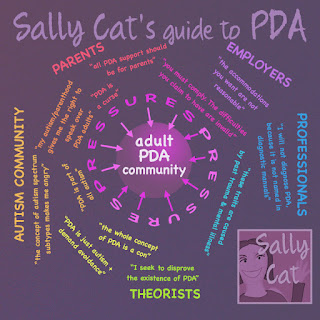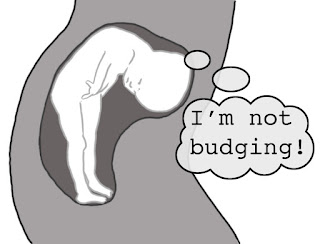The emotional impact of dismissal on the adult PDA community
The adult PDA community is bombarded with dismissal from multiple directions:
I cannot answer this question decisively, because no formal research has been carried out, but I can provide an informed response based on personal experience; my communication with fellow members of the adult PDA community; and my peer research (the validity of which is discussed in LINK).
RSD
RSD (rejection sensitive dysphoria) entails extreme and debilitating sensitivty to perceived rejection, which as experienced is physical pain. RSD has been thought of as a specifically ADHD trait, but evidence suggests it is experienced by other neurodivergent people, certainly including PDAers.
A noticeable number of adult PDAers I've conversed with have said they are affected by extreme rejection sensitivity. Being told that we, as individuals or as an entire neurogroup, do not count and that our opinions are worth nothing enhances our latent rejection sensitivity. Those of us who are prone to RSD cannot just ignore criticism and dismissal. It will always sting deeply, no matter how tough we wish ourselves to be.
Imposter syndrome
Imposter syndrome is a deep anxiety rooted in feelings of being "incompetent and having deceived others of one’s abilities" (Matise 2012). Although most commonly associated with people in successful careers, the syndrome also affects people with invisible differences (link). Undiagnosed adult PDAers frequently confess to feeling fraudulant in their self-diagnoses. "I might be mistaken," they admit, "in identifying with PDA. All my traits could be explained by other conditions, but I'm not sure what else fits."
Fawning
This, in fact, lay behind our joint decision to found Free PDA.
Watch out PDA critics: we're up in arms and feisty!
- Official bodies and diagnosticians who, if they acknowledge PDA at all, exclude adults. Here is an example
- Parents speaking over adult PDA voices in designated PDA support groups, and assuming that “PDA support” is for parents only
- Academics such as Professor Jonathan Green, who argues that PDA is a falsehood propagated by parents misled by social media hype (link)
- Autistic theorists, such as Damian Milton (who argues that PDAers are autistics deemed pathological because they misfit society), and Richard Woods (who sees PDAers as gullible victims of what he terms "the autism industry"). Both views are critiqued here.
- Adult autistics arguing that PDA has no validity as an autism spectrum subtype. For example, I found this comment published on a public blog, “the main reason I reject PDA however (and I’m someone who formally self-identified as such) is that it divides autistic people in exactly the same way as the Aspergers label does. We are all autistic and sub-dividing us like this is not something I care for anymore. Especially when the edges of these labels are fuzzy and with so much overlap.”
- Fellow adult PDAers arguing that 95% of the adult community are not really PDA so should be ignored (my critique of this stance is outlined here). I’ve even heard a diagnosed PDAer disparaging the adult PDA community as “a bunch of whingers” whose opinions are worth less than those of diagnosed children.
I cannot answer this question decisively, because no formal research has been carried out, but I can provide an informed response based on personal experience; my communication with fellow members of the adult PDA community; and my peer research (the validity of which is discussed in LINK).
RSD
RSD (rejection sensitive dysphoria) entails extreme and debilitating sensitivty to perceived rejection, which as experienced is physical pain. RSD has been thought of as a specifically ADHD trait, but evidence suggests it is experienced by other neurodivergent people, certainly including PDAers.
A noticeable number of adult PDAers I've conversed with have said they are affected by extreme rejection sensitivity. Being told that we, as individuals or as an entire neurogroup, do not count and that our opinions are worth nothing enhances our latent rejection sensitivity. Those of us who are prone to RSD cannot just ignore criticism and dismissal. It will always sting deeply, no matter how tough we wish ourselves to be.
Imposter syndrome
Imposter syndrome is a deep anxiety rooted in feelings of being "incompetent and having deceived others of one’s abilities" (Matise 2012). Although most commonly associated with people in successful careers, the syndrome also affects people with invisible differences (link). Undiagnosed adult PDAers frequently confess to feeling fraudulant in their self-diagnoses. "I might be mistaken," they admit, "in identifying with PDA. All my traits could be explained by other conditions, but I'm not sure what else fits."
Fawning
Many fellow PDAers, myself included, say threat triggers them to fawn. Fawning can be understood as people-pleasing. The dark side of fawning is that it causes us to feel unworthy, feeding into imposter syndrome.
Like fight, flight and freeze, fawning is a threat response, and is associated with trauma survival. According to this article, the term was coined by Peter Walker “a C-PTSD survivor and licensed marriage and family therapist who specializes in helping adults who were traumatized in childhood”
The heightened anxiety and drive to escape demands that comes naturally with the PDA neurotype mimics the long-term psychological impact of trauma survival. Events that might scarce impact other neurotypes, can be highly traumatic for us.
Fawning causes us to believe other people’s needs take priority over own. This leaves us vulnerable to emotional abuse. We are prone to low self-esteem and struggle to speak up for our needs.
On a personal level, I spent most of my life with pretty much zero self-esteem. I sought whatever counselling I could access on a low income (my demand avoidance has rendered me incapable of earning a living wage), and would introduce myself to new counsellors saying, “I don’t really have any real problems, I’m not sure should really be here. I don’t want to waste your time.”
In this light, telling certain adult PDAers that we don't count and have no right to be heard will encourage the dire lack of self-esteem and helplessness inherent with the fawn response.
Pathological demand avoidance
Let us not forget our eponymous pathological demand avoidance. I have noticed in myself that ways out of things; reasons to give up, feed my PDA avoidance like kiln-dried wood cast into a fire. My innate avoidance-drive operates on a pre-conscious emotional level. It makes me desperate to avoid things by making them feel abhorrent. Derogatory words spoken against potential tasks are grabbed and amplified by my avoidance-drive to encourage me to stay the f••k away.
Pathological demand avoidance
Let us not forget our eponymous pathological demand avoidance. I have noticed in myself that ways out of things; reasons to give up, feed my PDA avoidance like kiln-dried wood cast into a fire. My innate avoidance-drive operates on a pre-conscious emotional level. It makes me desperate to avoid things by making them feel abhorrent. Derogatory words spoken against potential tasks are grabbed and amplified by my avoidance-drive to encourage me to stay the f••k away.
Telling PDAers that we are mistaken about our neurotype-identity; that PDA either doesn't exist, or doesn't match us, therefore empowers our inner demand avoider monsters to convince us to give up believing we are PDA.
Freedom-fighter mode activated
Happily, the emotional impact on PDAers of being unilaterally dismissed is not all negative. PDAers very commonly report being driven to fight on behalf of the downtrodden. Efforts to repress the adult PDA community therefore activate the PDAer firce protector-mode.This, in fact, lay behind our joint decision to found Free PDA.
Watch out PDA critics: we're up in arms and feisty!







Comments
Post a Comment